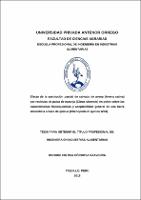Efecto de la sustitución parcial de salvado de avena (avena sativa) por residuos de pulpa de naranja (citrus sinensis) en polvo sobre las características fisicoquímicas y aceptabilidad general de una barra alimenticia a base de quinua (chenopodium quinoa wild)

View/
Download
(application/pdf: 1.373Mb)
(application/pdf: 1.373Mb)
Date
2017Author(s)
Córdova Saavedra, Brooke Cinthia
Metadata
Show full item recordAbstract
Se evaluó el efecto de la sustitución parcial de salvado de avena (Avena
sativa) por residuos de pulpa de naranja (Citrus sinensis) en polvo (26.66,
53.33 y 80%) sobre el contenido de fibra cruda, firmeza y aceptabilidad
general de una barra alimenticia a base de quinua (Chenopodium quinoa
Wild). Las variables respuesta fueron evaluadas dentro de las 48 h
después de elaborada la barra alimenticia. El análisis estadístico se
realizó con un nivel de confianza del 95%. La prueba de Levene demostró
la homogeneidad de varianza en las variables paramétricas. El análisis de
varianza indicó el efecto significativo (p<0.05) de la sustitución de salvado
de avena por residuos de pulpa de naranja en polvo sobre el contenido de
fibra cruda y firmeza. En la prueba de Duncan se determinó que la
sustitución de salvado de avena por residuos de pulpa de naranja en
polvo al 80% permitió obtener el mayor contenido de fibra cruda 10.86%,
mientras que para la firmeza instrumental la sustitución de 80% calificó
como el mejor valor con 9.86 N; por ser el valor más cercano a los
obtenidos en las barras comerciales. En la aceptabilidad general, el
tratamiento de sustitución de salvado de avena por residuos de naranja
en polvo al 53.33% obtuvo el mayor promedio (7 puntos) correspondiente
a la percepción ‘’Me gusta bastante’’. La prueba de Friedman evidenció
diferencia significativa (p<0.05) entre las muestras evaluadas. La prueba
de Wilcoxon, confirmó que la barra con sustitución al 53.33% tuvo la
mayor aceptabilidad general siendo la mejor en características
sensoriales. La sustitución de salvado de avena por residuos de pulpa de
naranja en polvo al 53.33% es considerada el mejor tratamiento por
presentar alto contenido de fibra cruda, adecuada firmeza instrumental y
la mayor aceptabilidad general en barras alimenticias a base de quinua. Was evaluated the effect of the partial replacement of oat bran (Avena
sativa) by powdered orange (Citrus sinensis) pulp residues (26.66, 53.33
and 80%) on raw fiber content, firmness and general acceptability of a
quinua (Chenopodium quinoa Wild) based food bar. The response
variables were evaluated within 48 h after the food bar was elaborated.
The statistical analysis was performed with a confidence level of 95%.
Levene test demonstrated the homogeneity of variance in the parametric
variables. The analysis of variance indicated the significant effect (p<0.05)
of the substitution of oat bran by residues of powdered orange pulp on the
crude fiber content and firmness. The Duncan test determined that the
substitution of oat bran by 80% orange pulp residues allowed to obtain the
highest content of crude fiber 10.86%, while for the instrumental firmness
the substitution of 80% qualified as the better value with 9.86 N; for being
the value closest to those obtained in the commercial bars. In the general
acceptability, the oat bran substitution by orange powder residues
treatment at 53.33% produced the highest average (7 points)
corresponding to the perception ““I like it a lot““. The Friedman test showed
a significant difference (p<0.05) between the samples evaluated. The
Wilcoxon test confirmed that the bar with 53.33% substitution had the
highest general acceptability being the best in sensory characteristics. The
oat bran substitution by orange pulp powder residues at 53.33% is
considered the best treatment due to its high crude fiber content, adequate
instrumental firmness and the greater general acceptability in quinoa
based food bars.
Subject
Collections
- Industrias Alimentarias [152]

